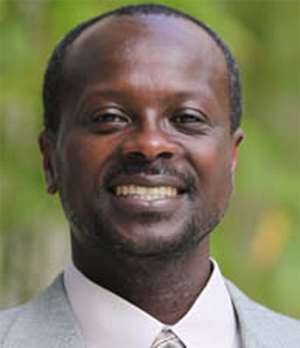
Professor Stephen Kwaku Asare
The Supreme Court yesterday adjourned sine die a suit filed by Professor Stephen Kwaku Asare, a Ghanaian law professor based in Florida in the United States, against the General Legal Council (GLC) over admissions of the Ghana School of Law.
This was due to the fact that some of the empanelled judges wanted to recuse themselves from the case.
The Florida-based professor has an issue with the way entrance exams and interviews are conducted by the school.
The announcement was made by Justice Sophia Adinyera who was to preside over the matter.
Since some of the judges wanted to be recused, the panel did not sit. Justice Adinyera made the announcement while she was presiding over another case.
None of the parties was present except Kizito Beyuo, who is counsel for the Legal Council.
The professor, who is also suing the Attorney-General (A-G), believes that the rigid ceiling imposed by the GLC on the Bachelor of Law Degree (LLB) Holders who would be allowed an opportunity to train and become lawyers is grossly unfair and overrides national interest.
He wants the court to declare that GLC, by allowing only 251 students to pursue professional legal education, is capricious and in excess of statutory authority and is contrary to constitutional right and power.
The learned professor stated that the legal profession should be an open ethically regulated meritocracy serving the legal needs of Ghana and Ghanaians and not a cartel serving the high priced needs or economic interest of a privileged few.
The plaintiff noted that the Legal Professions Act 32 enjoins the GLC to afford opportunities for students to read and to make arrangement for legal education in a proper manner through the school of law and said the act prescribes persons who qualify to be admitted to the school and the qualification needed.
He argued that the rigid ceiling process of admission detracts the purpose of selecting qualified students as it will pass a student irrespective of his performance, and said such an act is alien to Act 32.
According to him, the council has set up an Independent Examination Board (IEB) to conduct entrance examinations and interviews, adding that the said responsibility according to Act 32 rests with the council.
Touching on the marks obtained by students who took part in the entrance exam this year, the professor said the threshold disqualifies more than two thirds of those who have met the admission standards, adding that it is the only school in the world where students do not know the mark they need to obtain in order to pass.
The lecturer stressed that many good students are being prevented from pursuing the professional component of their legal education even though they have solid LLB Degrees.
The plaintiff consequently wants the court to declare that the council's use of interview is highly subjective and an unreliable mode of examining students, which is not in accordance with the law.
He also wants a declaration that the entrance examinations are not recognisable by law and cannot be used as a means to deny students the opportunity to pursue their legal education.
A Daily Guide Report




 Meta releases new version of conversational AI across its platforms
Meta releases new version of conversational AI across its platforms
 Cape Town named Africa’s Best Airport 2024 by Skytrax
Cape Town named Africa’s Best Airport 2024 by Skytrax
 Bono East: Four injured after hearse transporting corpse crashes into a truck
Bono East: Four injured after hearse transporting corpse crashes into a truck
 ‘Be courageous, find your voice to defend our democracy’ — Sam Jonah urges journ...
‘Be courageous, find your voice to defend our democracy’ — Sam Jonah urges journ...
 Exodus of doctors, nurses and teachers have worsened because of unserious Akufo-...
Exodus of doctors, nurses and teachers have worsened because of unserious Akufo-...
 2024 election: Avoid insults, cutting down people in search of power – National ...
2024 election: Avoid insults, cutting down people in search of power – National ...
 ‘You passed through the back door but congratulations’ — Atubiga on Prof Jane Na...
‘You passed through the back door but congratulations’ — Atubiga on Prof Jane Na...
 Government’s $21.1 billion added to the stock of public debt has been spent judi...
Government’s $21.1 billion added to the stock of public debt has been spent judi...
 Akufo-Addo will soon relocate Mahama’s Ridge Hospital to Kumasi for recommission...
Akufo-Addo will soon relocate Mahama’s Ridge Hospital to Kumasi for recommission...
 We must not compromise on our defence of national interest; this is the time to ...
We must not compromise on our defence of national interest; this is the time to ...
